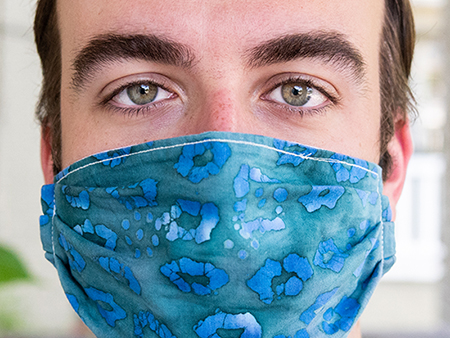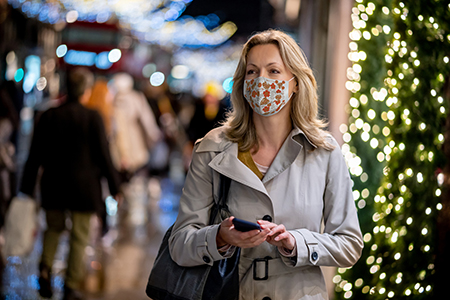Media contact: Bob Shepard
 We’ve lived through a lot this year. Not only have we dealt with a global health epidemic that has impacted more than 67 million individuals, but we have also endured a complexity of social circumstances. As we embark on the winter season of this tumultuous year, we are met with shorter days, spiking COVID-19 cases and unconventional holiday plans.
We’ve lived through a lot this year. Not only have we dealt with a global health epidemic that has impacted more than 67 million individuals, but we have also endured a complexity of social circumstances. As we embark on the winter season of this tumultuous year, we are met with shorter days, spiking COVID-19 cases and unconventional holiday plans.
Staying COVID-19 safe and protected is important, but tuning in to our well-being is just as critical.
“COVID-19 has posed a substantial threat to our physical wellness; but the ever-present danger posed by the virus, and even the social distancing practices themselves, have threatened other aspects of wellness,” said David Rogers, M.D., MPH, chief wellness officer of UAB Medicine. “Practices that promote physical wellness must be combined with those that address the occupational, spiritual, emotional and intellectual features of our selves. Doing so will allow us to navigate through this adversity, emerge with an appreciation for wellness and be even more resilient for future challenges.”
As a nation, we are experiencing a time of collective grief and heightened anxiety. Not only have individuals lost loved ones due to the pandemic, but other life losses have occurred, such as the loss of normalcy in celebrations, weddings and graduations. Feelings of anxiety, loneliness, depression and anger are common right now, and they may often exist simultaneously.
Clinical psychologists, integrative doctors and wellness experts from the School of Medicine and beyond have come together to give their top suggestions on how to brave the turbulent winter months.
Know that your feelings are normal
Megan McMurray, Ph.D., clinical psychologist in the UAB Medicine Office of Wellness, says that any range of emotions is common right now.
“This year has been filled with unprecedented uncertainty, which has led many people to experience feelings of anxiety and depression,” said McMurray. “Anger has also been quite common, especially with the election and inconsistent mask-wearing. As the pandemic drags on, emotional fatigue has also cropped up.”
McMurray acknowledges that many people are exhausted by performing constant risk assessments for otherwise normal activities.
“It’s now becoming draining to continuously decide if daily activities are safe, like deciding whether to eat indoors or outdoors, if it’s OK to schedule playdates for kids, or if it’s safe to visit family during the holidays,” she said. “When people do engage in social activities, they may experience guilt afterward, perhaps wondering if they put themselves or others at risk. The most essential thing to remember is that there’s no wrong feeling right now.”
Lean into your feelings
McMurray suggests that “leaning in” to difficult and complex emotions is healthy and crucial to well-being. There is a common assumption that negative emotions are ‘bad’ and that we should try to get rid of them. We commonly hear messages to ‘think positive’ or ‘positive vibes only.’ Fighting against our own feelings is a losing battle that causes even more suffering. To build resilience and a capacity to handle difficult experiences, we want to move through the difficult emotion and get to the other side, not step around the hard feeling or push it away.
Try this: To sincerely feel your feelings, McMurray suggests to stop resisting and turn toward the difficult emotion(s). Then, take a deep breath and “sit with” the anxiety, fear, anger, guilt, sadness or other feeling — without judgment. Identify the emotions with descriptive words. For example, start with the most obvious feeling, then take it one step further. Feeling anger may also be described as feeling threatened, frustrated, withdrawn, devastated or resentful. Last, imagine “opening up the door” to the emotion. This visual representation helps acknowledge and accept the emotion. There is power in identifying emotions.
 Explore mindfulness
Explore mindfulness
Similarly, mindfulness is a great tool to utilize through the winter months. Carolina Salvador, M.D., assistant professor of medicine and director of the Integrative Medicine, Wellness and Health clinic, recommends practicing a moment-by-moment awareness of sensation and feeling — without interpretation or judgment.
“When we practice mindfulness, our thoughts tune into what we’re sensing in the present moment rather than rehashing the past or imagining the future,” said Salvador.
Salvador affirms that, as we go through these particularly challenging times and holidays, being mindful and aware of our thoughts without judgment, plus having compassion toward ourselves and others, could bring us the necessary strength to keep going. She says that mindfulness can stop rash reactions and help us respond in more beneficial ways. Mindfulness also helps us practice gratitude, which is scientifically proved to raise wellness levels.
“When you apply mindfulness, you remove judgment, which allows a different perspective,” she said. “You find parts [of life] for which you can give thanks. Practicing mindfulness exercises can have many positive benefits, such as decreasing stress, anxiety and depression, reducing negative thinking and distraction, and improving mood.”
Try this: Schedule out time in the day to slow down and pay attention to one routine activity. Be it drinking a morning coffee or eating lunch, notice the environment in that moment with all five senses. What do you smell, see, hear, taste and feel? What does the surrounding look like? Try keeping thoughts only on the present moment.
Nourish your physical health
During this time, well-being may be enhanced by practicing mindfulness for basic needs, too. Shorter winter days can make even the simplest of tasks feel daunting. When it comes to mealtime, many feel anxiety and stress during the pandemic about eating healthy, meal prep and buying groceries. Riley Thornton, RDN, L.D., wellness manager of UAB Employee Wellness, suggests planning ahead when possible.
“Whether it’s making an extra serving at dinner to eat at lunch the next day, saving leftovers in the freezer, or adding more shelf-stable items (whole grain pasta, brown rice, beans, lentils) to your shopping list, give yourself a head start on meals by planning ahead in the most convenient ways for you,” said Thornton.
Another simple way to stay physically well through the winter is to stay hydrated. With the cold and dry months, it’s easy to forget to drink enough water. But staying hydrated comes with a copious amount of physical and emotional perks.
“Being properly hydrated is key to maintaining good health and contributes to many important body functions,” she said. “While plain water is a great first choice to stay hydrated, other liquids and some foods can also contribute to your hydration status. Consider drinking 100 percent orange juice fortified with vitamin D, adding frozen berries or citrus fruits to plain water, or lightening lemonade by adding extra water. Get creative and mix up your hydration habits throughout the day. To monitor your own hydration, pay attention to the color of your urine and aim for it to be more pale yellow than dark yellow.”
Try this: Focus on balance, moderation and variety — rather than getting it “right” every day. Employ moderation to enjoy the foods you love while also consuming meals similar to those on Thornton’s suggested resource: MyPlate Guidelines. Think of variety when you look at your plate, aiming for different food groups that provide different vitamins and minerals, such as vitamin D, iron, vitamin C and calcium.
 Incorporate mindful movement
Incorporate mindful movement
McMurray suggests that emotional and physical health are inextricably linked.
“Prolonged stress, like what many of us are experiencing during COVID-19, can take a toll on all systems of the body, from increasing the risk of cardiovascular problems to weight gain,” she said. “Poor emotional health can weaken the body’s immune system. We also have a tendency to reduce our self-care activities when emotionally distressed, and may not feel like exercising, eating nutritious foods or taking medicine as prescribed. We may resort to unhealthy eating patterns, stream too many shows or drink too many glasses of wine before bed, all of which can lead to further decline in overall health.”
Mindful movement can help alleviate symptoms of physical and emotional stress. Incorporating elements of mindfulness into an exercise routine can be done by placing as much attention as possible on the movements of the body, breathing and surroundings. Research suggests various benefits to the practice of mindful movement, including lower stress and anxiety, as well as improved concentration. Mindful movement is being intentional and aware of every move, and focusing on how movements make you feel. Thornton adds that balancing foods with your activity throughout the day is key to a mindful emotion/body connection.
Try this: Prioritize movement, even in small amounts, throughout the day. Try yoga or even a simple walk outdoors. During movement, try to focus on how your body is feeling, as well as what’s going on in the surrounding environment. If your mind starts to wander (and it will), gently bring your awareness back to the present moment.
Practice wellness at work
For some, this year has blurred the lines of personal and professional life with the normalization of remote work. For others, continued on-site work has been a source of stress due to constant safety concerns and risk assessment. In a place where we spend 40 hours or more of our time, we need tools to feel well at work, too. Lauren Nassetta, M.D., chief wellness officer of the Department of Pediatrics, suggests that healthy work environments increase employee engagement and positively impact well-being.
“Engaged employees are less likely to develop job burnout and are more likely to contribute significantly to the success of the team or workgroup,” said Nassetta. “Happier employees are not only more physically healthy than unhappy ones, they are also more creative, more productive and more likely to stay in their positions as part of the team.”
Nassetta confirms that workplace culture is where work wellness starts.
“Stress and burdens are inherent in any job, and can lead to negative emotions that prevent thriving,” she said. “Generating a positive work culture is dependent on the values, behavior and shared experiences of each team member. Creating a positive work culture starts with making wellness a priority, and then creating necessary systems and encouraging behaviors that support it. An environment in which workers feel both physically and emotionally safe is an essential foundation on which to build trust and engagement.”
Nassetta suggests asking “Can this be changed?” when we face a stressful incident or numerous stressors at our job. If so, work to make it better. If not, change the perspective. It is often our thoughts about something, not the thing itself, that determine our feelings.
Try this: Start by separating facts and thoughts. Let’s look at a burdensome new company policy as an example. Re-frame an immediate reaction of “That is the worst new policy ever!” into a responsive consideration: “The new policy states …” (facts) and “I dislike it because …” (thoughts). From here, we can choose new thoughts that result in positive feelings, such as “I dislike parts of the policy, but it might be helpful because …” Re-structuring the situation more positively is essential to maintaining joy, and brings about the possibility to enjoy work responsibilities even more.
 Invest time in long-term wellness
Invest time in long-term wellness
Counseling may be a good pathway for longstanding wellness. Tami Long, Ph.D., LPC, director of the UAB Employee Assistance and Counseling Center, says that counseling gives individuals struggling with life challenges — big or small — a place to be heard, a place to engage in self-exploration and a place to identify effective coping strategies to reduce stress.
“Counseling is important year-round,” said Long. “However, during the winter months, some individuals are more susceptible to seasonal affective disorder or ‘winter depression,’ due to the cold temperatures, gray cloudy days and the sun setting earlier. It’s important to be aware of mental health and well-being by monitoring mood to determine shifts in thought patterns, behaviors and actions that may warrant seeing a counselor.”
Likewise, Long says that if well-being is put on the back burner, then the result for many is increased anxiety, depression, or other mental health-related problems that will eventually impact relationships at home and work.
For employees at UAB and members of their immediate households, the Employee Assistance & Counseling Center offers counseling, coaching and other EAP services at no cost.
“We are here to assist employees with all mental health support needs,” Long said. “Do not hesitate to reach out.”
Additionally, Oasis Counseling for Women and Children offers services on a sliding scale to members of the community.
If you would like to read more resources about wellness, check out this article on How to overcome COVID-19 fatigue or Things you can do today to help improve your mental health amid COVID-19 outbreak.